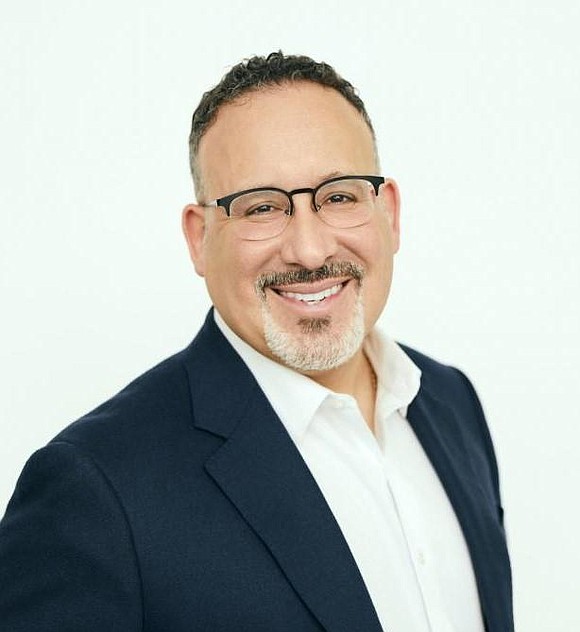Department Opens Application Period for Hundreds of Millions of Dollars in Funds to Increase the Number of School-Based Mental Health Providers in Schools Provided Through the Bipartisan Safer Communi
Style Magazine Newswire | 10/3/2022, 12:40 p.m.
Today, the U.S. Department of Education (Department) is releasing Notices Inviting Applications for two grant programs to increase access to mental health services for students and young people, totaling $280 million, that were funded through the Bipartisan Safer Communities Act (BSCA) and the Fiscal Year 2022 Omnibus Appropriations. The BSCA provided historic funding to help meet President Biden’s goal of doubling the number of school-based mental health professionals and tackling the nation’s mental health crisis. This is the first of $1 billion in Bipartisan Safer Communities Act funds over the next five years that the Department of Education will award for this purpose.
"For too long, schools have lacked the resources to hire enough school-based mental health providers, when at the same time, educators are often first to notice when a student is slipping academically or struggling because of mental health challenges," said U.S. Secretary of Education Miguel Cardona. "We know children and youth can’t do their best learning when they’re experiencing depression, anxiety, and other mental health challenges whether they stem from community violence, social isolation from the pandemic, loss of loved ones, bullying, harassment, or something else. This funding from the Bipartisan Safer Communities Act will help schools raise the bar for student mental health by recruiting, preparing, hiring, and training highly qualified school-based mental health providers, including in underserved communities and for students such as multilingual learners and those from low-income backgrounds and in rural communities, where access to such services can be limited.”
The first grant program, School-Based Mental Health Services (SBMH), provides funding to schools to increase the number of credentialed school-based mental health professionals. The second program, the Mental Health Service Professional Demonstration (MHSP) grants, support districts in hiring additional school-based mental health service providers in high-need districts by boosting the mental health profession pipeline. This includes investing in innovative partnerships between school districts and institutions of higher education to prepare qualified school-based mental health services providers for employment in schools. These programs will increase the number of mental health service providers from diverse backgrounds or from the communities they serve, including ensuring access to services for children and youth who are English learners.
This announcement is part of the Biden-Harris Administration’s commitment to addressing the nation’s mental health crisis by providing more resources and supports to help schools address students’ mental health needs. As part of that effort, in January, Secretary Cardona laid out the department’s goals and vision for helping students recover from the pandemic, including by increasing access to social, emotional, and mental health supports for all students. Just recently, the Department announced the Stronger Connections Grant program, which are awards totaling nearly $1 billion to 56 states and territories through BSCA to help schools in high-need districts provide students with safe and supportive learning opportunities and environments that are critical for their success. At the beginning of the school year, the Department sent a letter with U.S. Health and Human Services Secretary Becerra to governors across the country to highlight federal resources available to states and schools to invest in mental health services for students. The Department also awarded $122 billion in ARP Elementary and Secondary School Emergency Relief (ESSER) funds to help schools reopen and recover, and experts indicate more than $2 billion has been directed to hire more school psychologists, counselors, and other mental health professionals in K-12 schools. With the help of these funds, as of July, compared with the pre-pandemic period, the number of school social workers is up 54% and the number of school counselors is up 22%.
Coinciding with this announcement from the Department of Education, today the Department of Health and Human Services is announcing awards of nearly $27 million to improve and expand mental health care for children. This funding will offer timely mental health support to children and adolescents by training pediatricians and other children’s health care providers in treating mental health conditions and by providing tele-consultation to bring mental health expert support directly to pediatric primary care providers.
School-Based Mental Health Services Grant Program
The SBMH grant program provides competitive grants to State educational agencies (SEAs), Local educational agencies (LEAs), and consortia of LEAs to increase the number of credentialed school-based mental health service providers delivering school-based mental health services to students in LEAs with demonstrated need. The grant provides $144 million each year for 5 years, with an average award size of $1,750,000, ranging from $500,000 to $3,000,000 per year. The Department anticipates making up to 150 awards. Two technical assistance webinars for prospective applicants will be provided: one on October 11th, 2022, and one on October 19th, 2022, prior to the application deadline. Webinar information will be available here.
Mental Health Service Professional Demonstration Grant Program
The MHSP Demonstration grant program provides competitive grants to support and demonstrate innovative partnerships to train school-based mental health services providers for employment in schools and LEAs. The grant program aims to address a challenge facing districts and schools across the country: an insufficient supply of school-based mental health professionals to meet the needs of students. The partnerships must include (1) one or more high-need LEA or an SEA on behalf of one or more high-need LEA; and (2) one or more eligible institutions of higher education (IHE). These grants make available $143 million a year for 5 years, with an average award size of $800,000, ranging from $400,000 to $1,200,000 per year. The Department anticipates making up to 250 awards. Two technical assistance webinars for prospective applicants will be provided: one on October 12th, 2022, and one on October 18th, 2022, prior to the application deadline. Webinar information will be available here.




